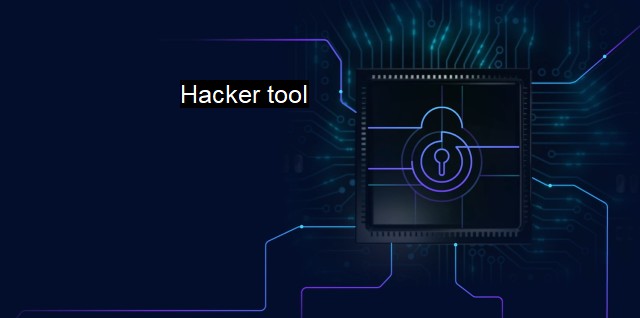What is Hacker tool?
The Arsenal of Cyberattackers: An In-depth Look at Hacker Tools and Their Implications for Cybersecurity
The term "hacker tool" carries paramount importance. Without an understanding of what constitutes a hacker tool, it is hard to grasp the scope of cybersecurity, consequently making it challenging to implement antivirus measures effectively. A hacker tool is considered any software program or automated mechanism used by cybercriminals, or 'hackers', to infiltrate systems, breach security firewalls, acquire unauthorized control, extract critical information, or disrupt the normal functioning of a network or system.Hacker tools serve a plethora of nefarious purposes. They can exploit vulnerabilities in a system, perform password cracking, conduct denial of service (DoS) attacks, spy on the user, manipulate system controls, deploy computer worms, introduce Trojan viruses, and employ other illegal activities. But interestingly, hacker tools are not evil by default. The same tools can and are used by ethical hackers to identify potential vulnerabilities, remedy security flaws, improve system security, and check for intrusions before they occur.
Notably, the spectrum of hacker tools is broad and encapsulates a myriad of components. In the hands of a hacker, simple software like off-the-shell programming scripts can serve as exploit tools. But, ordinarily, hacker tools can be placed into various categories including exploiting software errors, social engineering tools, sniffing tools, rootkits, and botnets.
Exploiting software errors underscores the implementation of bugs or code gaps to undermine the functionality of a software or system. Hackers exploit these gaps to gain control over the software, manipulate its working, generally, carry out malicious actions.
Social engineering tools represent indirect strategies used by hackers to acquire sensitive information like passwords. They can involve techniques of persuasion and manipulation to deceive individuals into revealing private credentials. A prime example is phishing software that sends duplicate emails mirroring trustworthy companies, luring the recipient to reveal confidential data.
Sniffing tools also known as packet sniffers, observe network trafficking, and extract pieces of unencrypted information. In sinister applications, they work silently accumulating a significant amount of data without the users' knowledge or consent.
Rootkits, significantly advanced hacker tools, provide continual unauthorized access to a compromised system. Ostensibly regular files, these operate secretly deep within the cyberspace, avoiding detection from standard antivirus software.
Botnets refer to a network of computers unknowingly controlled by a hacker who can use them to perpetuate large-scale cybercrime, including distributed denial-of-service (DDoS) attacks and data theft.
Bearing in mind the perilous impact of these tools, reliable antivirus measures entail rigorous application and constant vigilance. Modern cybersecurity stances aim not only at repairing the damage post-incident but also aim to proactively predict and prevent threats. The antivirus measures include regular system health checks, using encrypted networks, raising user awareness about email spoofing and other risks, constant software updating, stronger user authentication process, detecting and disabling rootkits, and breaking into botnets.
Tech giants like Microsoft and Google, deploy various security tools to identify and eliminate hacker tools. They run phishing tests, conduct penetration testing, sand-boxing, behavioral analysis, use artificial intelligence, rules and patents to forecast potential security threats and shore up vulnerabilities.
Understanding hacker tools is crucial from both the cybersecurity and antivirus perspectives. Such understanding not only equips the system with better defense mechanisms, but it also paves the way towards refined cybersecurity laws, ensuring the cyberspace remains a safe environment for users. Despite the constant threat they pose, in the hands of ethical hackers, these same tools can be masters of protection, enacting measures to correct vulnerabilities and secure digital assets.

Hacker tool FAQs
What is a hacker tool and why are they significant in cybersecurity?
A hacker tool is a software or hardware tool that helps computer security enthusiasts test the security of computer systems. These tools are significant in cybersecurity because they assist security experts in identifying vulnerabilities and gaps in security that could be exploited by malicious hackers.Are all hacker tools illegal?
No, not all hacker tools are illegal. Some tools are designed to aid penetration testers or ethical hackers with an organization's permission to test the security of their systems. However, some tools are developed with the intent to facilitate malicious activity and are illegal to use.Do antivirus programs detect and remove hacker tools?
Yes, antivirus programs can detect and remove hacker tools if they are classified as malware or other types of unwanted software. However, some hacker tools may not be detected by traditional antivirus programs because they may have legitimate purposes or be used by security professionals.What measures can individuals and organizations take to protect themselves against hacker tools?
Individuals and organizations can take several measures to protect themselves against hacker tools. They should ensure that all software is up-to-date, use strong passwords and two-factor authentication, monitor their networks and systems for suspicious activity, and regularly back up important data. Additionally, they can use antivirus software and firewalls to help protect against known threats.| | A | | | B | | | C | | | D | | | E | | | F | | | G | | | H | | | I | | | J | | | K | | | L | | | M | |
| | N | | | O | | | P | | | Q | | | R | | | S | | | T | | | U | | | V | | | W | | | X | | | Y | | | Z | |
| | 1 | | | 2 | | | 3 | | | 4 | | | 7 | | | 8 | | |||||||